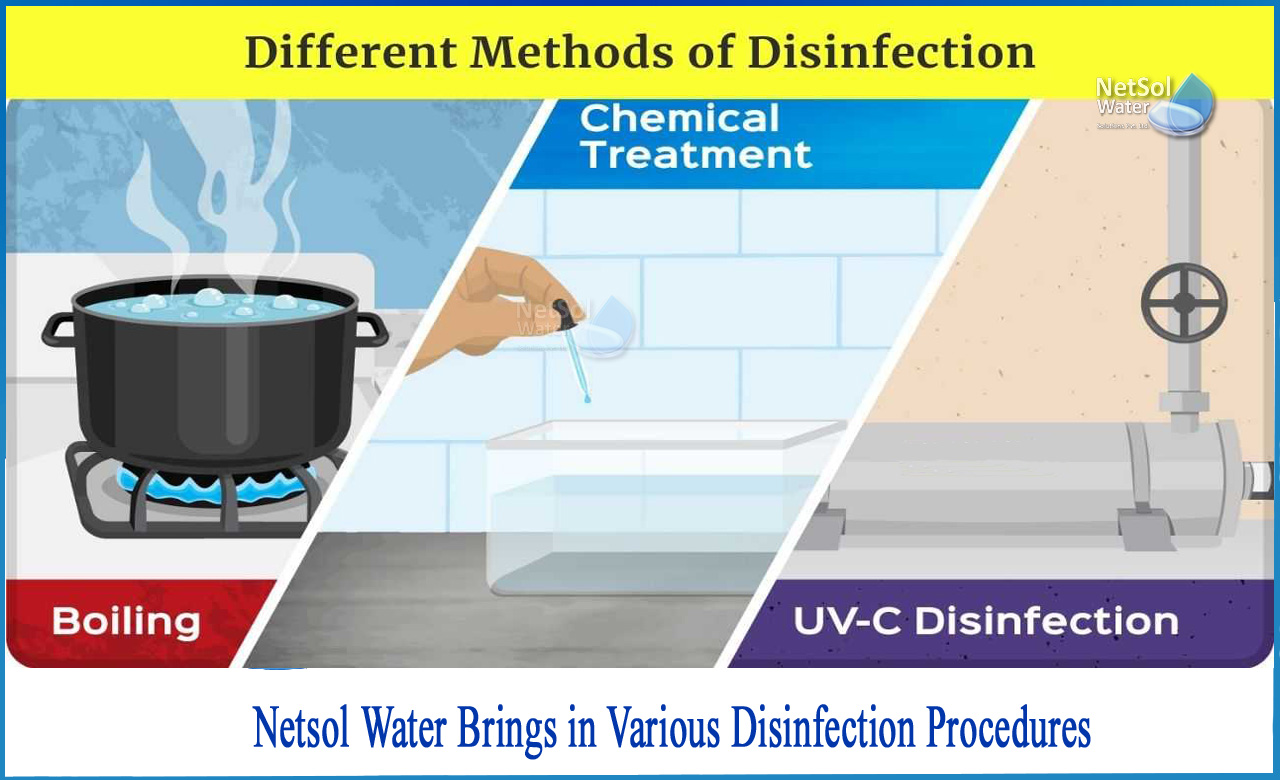What is disinfection procedures?
Disinfection is the process of killing, eliminating, or deactivating dangerous germs. Pathogenic bacteria' reproduction and growth are halted when they are destroyed or deactivated. Consumption of polluted water containing harmful germs can make people sick.
Disinfection and sterilisation are related procedures, but sterilisation eliminates all germs, both hazardous and harmless. As a result, disinfection is a better option.
Netsol Water uses a variety of disinfection procedures, including chlorine, ozone, ultraviolet light, and chloramines.
Methods of disinfection used by Netsol Water
1: Chlorine Gas
Chlorine is a yellowish-green gas. The gas is turned into a liquid by applying high pressure. It is poisonous. Chlorine gas is mostly used to disinfect water. Chlorine introduced into water is particularly effective at killing practically all harmful bacteria. It can be used as a primary disinfectant as well as a secondary disinfectant. Because the gas is so toxic, it cannot be used in a domestic system.
Advantages of chlorine gas
a): Chlorination is a less expensive option than using UV or ozone to clean water.
b):It's efficient against a wide variety of harmful bacteria.
c):Dosing rates can be easily managed because they are variable.
Limitations of chlorine gas
Despite the fact that chlorine gas is utilised as the best method for treating water in large-scale water distribution treatment plants and networks, it has a number of drawbacks. The application of a point-of-use (POU) treatment system may be hampered by several restrictions. Chlorination is opposed for a variety of reasons, including aesthetic, logistical, and health concerns.
2: Chlorination (sodium hypochlorite solution)
Sodium hypochlorite is a bleaching agent and a disinfectant in solution that is usually used to bleach papers or fabrics. The solution typically includes 10–15 percent of accessible chlorine, however it quickly loses its strength throughout the storage process. Because the pH, light, heat, and heavy metals all have an impact on the solution, a consistent regulated environment is required.
Advantages of chlorination
a):As a disinfectant, sodium hypochlorite can be employed.
b):The disinfectant properties of sodium hypochlorite and chlorine gas are similar.
c):When compared to chlorine gas disinfection, sodium hypochlorite disinfection poses fewer risks in terms of storage and handling.
3: Chloramines
Ammonia reacts with free chlorine to produce chloramines. They serve a crucial part in the distribution system's residual protection. They're extremely stable. There are fewer halogenated by-products created when compared to chlorine.
Advantage of chloramines
Chloramines are formed when ammonia combines with free chlorine. They play an important role in the residual protection of the distribution system. They're incredibly steady. When compared to chlorine, there are fewer halogenated by-products produced.
4: Ozonation
Ozone is an allotropic (unstable) oxygen formula in which three molecules combine to make a new one. It decomposes fast, releasing extremely reactive free radicals. The oxidation potential of ozone (2.7 V) is higher than that of chlorine (1.36) or hypochlorite (1.49) ions, which are commonly utilised as oxidants in wastewater treatment. Only the hydroxyl radical (•OH) and fluoride have a higher oxidation capability than ozone.
Advantages of ozonation
a):Ozone has a high oxidising capacity.
b):Germs (including viruses) must be eliminated in a matter of seconds, which necessitates a quick reaction time.
c):There is no change in colour or flavour.
d):It does not necessitate the use of any chemicals.
e):After disinfection, water is given oxygen.
f):Algae is destroyed and removed.
5: Ultraviolet radiation (UV)
Waste water, drinking water, and aquaculture can all benefit from UV treatment. UV radiation disinfects germs by modifying their biological components, specifically disrupting chemical bonds in DNA, RNA, and proteins.
Advantages of Ultraviolet radiation
a):It reduces the potential for regrowth within the distribution system, ensuring that the concentration of biodegradable or assimilable organic carbon (AOC) does not rise.
b):There are no issues about interactions with pipe materials.
c):There is no production of chlorinated disinfection by-product (DBP) when used in conjunction with chloramines.
Limitations of ultraviolet radiation
a):There are various limits to UV disinfection in developing countries. The energy need is the primary stumbling block. Electric power supply cannot be guaranteed in many systems.
b):One restriction could be that there isn't even a single test available to check for proper ray disinfection. Because it does not leave any residues, it is solely effective as a primary disinfectant.
With Netsol Water, the facility's capability may be expanded for a cheap initial investment and low ongoing operational cost, ensuring that the plant can run more effectively and without interruption and with a better quality water.
Netsol Water is Greater Noida-based leading water & wastewater treatment plant manufacturer. We are industry's most demanding company based on client review and work quality. We are known as best commercial RO plant manufacturers, industrial RO plant manufacturer, sewage treatment plant manufacturer, Water Softener Plant Manufacturers and effluent treatment plant manufacturers. Apart from this 24x7 customer support is our USP. Call on +91-9650608473, or write us at enquiry@netsolwater.com for any support, inquiry or product-purchase related query.



